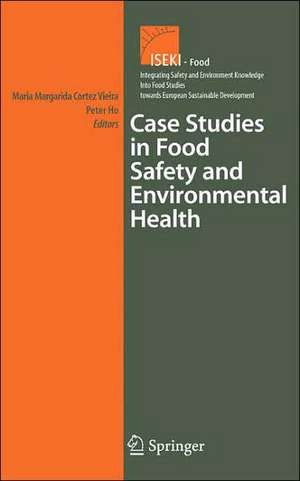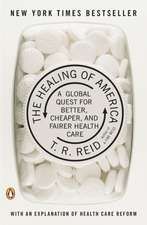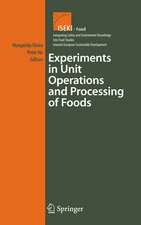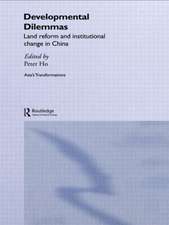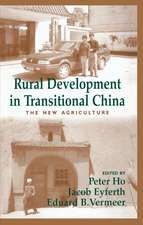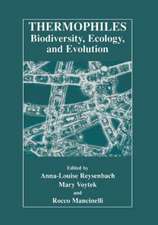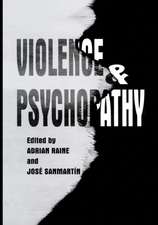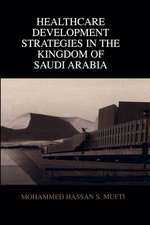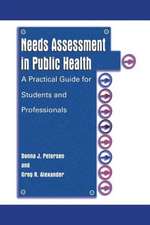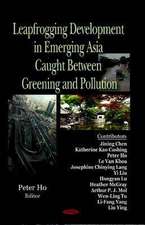Case Studies in Food Safety and Environmental Health: Integrating Food Science and Engineering Knowledge Into the Food Chain, cartea 6
Editat de Peter Ho, Maria Margarida Cortez Vieiraen Limba Engleză Hardback – 22 dec 2006
The book is divided into three main sections:
- microbial food safety
- chemical residues and contaminants
- risk assessment and food legislation
The ISEKI-Food book series is a collection where various aspects of food safety and environmental issues are introduced and reviewed by scientists specializing in the field. In all of the books a special emphasis is placed on including case studies applicable to each specific topic. The books are intended for graduate students and senior level undergraduate students as well as professionals and researchers interested in food safety and environmental issues applicable to food safety.
"ISEKI-Food" is an acronym for "Integrating Safety and Environmental Knowledge Into Food Studies". Participants in the ISEKI-Food network, coordinated by Professor Cristina Silva at The Catholic University of Portugal, come from 29 countries in Europe and most of the institutes and universities involved with Food Science education at the university level in Europe are represented. Some international companies and non teaching institutions have also participated in the network. The main objectives of ISEKI-Food are to improve the harmonization of studies in food science and engineering in Europe and to develop and adapt food science curricula emphasizing the inclusion of safety and environmental topics.
| Toate formatele și edițiile | Preț | Express |
|---|---|---|
| Paperback (1) | 705.68 lei 6-8 săpt. | |
| Springer Us – 8 dec 2010 | 705.68 lei 6-8 săpt. | |
| Hardback (1) | 710.43 lei 6-8 săpt. | |
| Springer Us – 22 dec 2006 | 710.43 lei 6-8 săpt. |
Preț: 710.43 lei
Preț vechi: 747.82 lei
-5% Nou
Puncte Express: 1066
Preț estimativ în valută:
135.93€ • 141.94$ • 112.25£
135.93€ • 141.94$ • 112.25£
Carte tipărită la comandă
Livrare economică 16-30 aprilie
Preluare comenzi: 021 569.72.76
Specificații
ISBN-13: 9780387335148
ISBN-10: 0387335145
Pagini: 93
Ilustrații: XVI, 94 p.
Dimensiuni: 155 x 235 x 12 mm
Greutate: 0.29 kg
Ediția:2007
Editura: Springer Us
Colecția Springer
Seria Integrating Food Science and Engineering Knowledge Into the Food Chain
Locul publicării:New York, NY, United States
ISBN-10: 0387335145
Pagini: 93
Ilustrații: XVI, 94 p.
Dimensiuni: 155 x 235 x 12 mm
Greutate: 0.29 kg
Ediția:2007
Editura: Springer Us
Colecția Springer
Seria Integrating Food Science and Engineering Knowledge Into the Food Chain
Locul publicării:New York, NY, United States
Public țintă
ResearchCuprins
Specific Issues.- Acrylamide and Human Health.- Nitrates in Food, Health and the Environment.- Endocrine disrupting compounds in olive oil.- Clostridium botulinum and Botulism.- Listeria monocytogenes and Listeriosis.- Historical perspectives.- The Toxic Oil Syndrome in Spain.- A ban on Paprika in Hungary.- An Outbreak of Botulism in Italy.- Listeriosis from butter in Finland.- Research-based.- Alternative solutions for the treatment of food produce.- Heavy metals in Organic milk.- Aflatoxins in farmed fish in Estonia.- Mycotoxins in Cereal Products from Romania.
Textul de pe ultima copertă
The ISEKI-Food book series is a collection where various aspects of food safety and environmental issues are introduced and reviewed by scientists specializing in the field. In all of the books a special emphasis is placed on including case studies applicable to each specific topic. The books are intended for graduate students and senior level undergraduate students as well as professionals and researchers interested in food safety and environmental issues applicable to food safety.
"ISEKI-Food" is an acronym for "Integrating Safety and Environmental Knowledge Into Food Studies". Participants in the ISEKI-Food network, coordinated by Professor Cristina Silva at The Catholic University of Portugal, come from 29 countries in Europe and most of the institutes and universities involved with Food Science education at the university level in Europe are represented. Some international companies and non teaching institutions have also participated in the network. The main objectives of ISEKI-Food are to improve the harmonization of studies in food science and engineering in Europe and to develop and adapt food science curricula emphasizing the inclusion of safety and environmental topics.
Case Studies in Food Safety and Environmental Health, the sixth volume of the ISEKI-Food book series, presents food safety concepts and issues in a practical and applied framework for use in the classroom.
The book is divided into three main sections:
About the Editors
Margarida Vieira is an associate professor at the University of Algarve's School of Technology.
Peter Ho is an assistant professor at the Polytechnic Institute of Viana do Castelo's School of Technology and Management.
About the Series Editor
Kristberg Kristbergsson is Professor of Food Science at the Department of Food Science and Human Nutrition at the University of Iceland, Iceland.
"ISEKI-Food" is an acronym for "Integrating Safety and Environmental Knowledge Into Food Studies". Participants in the ISEKI-Food network, coordinated by Professor Cristina Silva at The Catholic University of Portugal, come from 29 countries in Europe and most of the institutes and universities involved with Food Science education at the university level in Europe are represented. Some international companies and non teaching institutions have also participated in the network. The main objectives of ISEKI-Food are to improve the harmonization of studies in food science and engineering in Europe and to develop and adapt food science curricula emphasizing the inclusion of safety and environmental topics.
Case Studies in Food Safety and Environmental Health, the sixth volume of the ISEKI-Food book series, presents food safety concepts and issues in a practical and applied framework for use in the classroom.
The book is divided into three main sections:
- microbial food safety
- chemical residues and contaminants
- risk assessment and food legislation
About the Editors
Margarida Vieira is an associate professor at the University of Algarve's School of Technology.
Peter Ho is an assistant professor at the Polytechnic Institute of Viana do Castelo's School of Technology and Management.
About the Series Editor
Kristberg Kristbergsson is Professor of Food Science at the Department of Food Science and Human Nutrition at the University of Iceland, Iceland.
Caracteristici
Discusses case studies that impact food safety and practice
